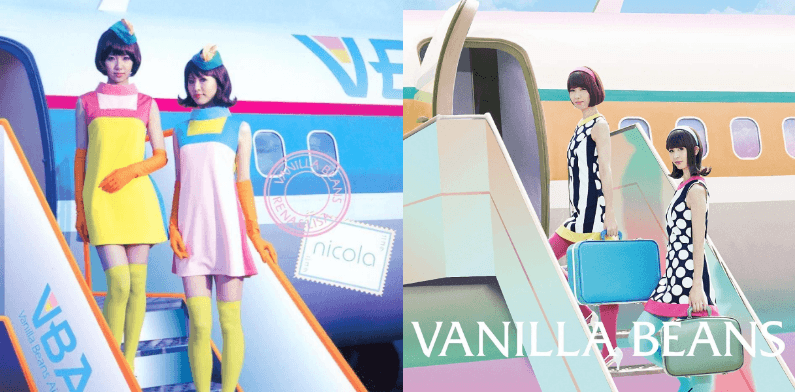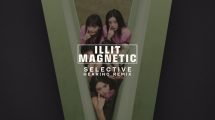
Now that the idol boom that started in the late 2000s in Japan has come full circle and come to an end, for most intents and purposes, there is one project from this time that I look back on far more fondly than any others and pops first to my mind when I think of this era, and that would be the duo of Vanilla Beans.
I first learned of the project back around the time of their debut, which started on the indie FLOWER LABEL, and the little exposure I had to them back during this time was from Tokyo Idol Festival or a few MVs from YouTube around that time, and somehow I only ended up hearing the few songs from them which I still don’t care for very much to this day, and didn’t hear the good music they were producing in this time.
Because of this, I mostly disregarded them until a few years later when they switched over to T-Palette records and their musical output seemed to leap forward exponentially, with single after single and album after album being of extremely high quality, variety, and musicality of which I hadn’t seen so consistently in a number of years from this industry.
On top of the music quality and focus on being a love letter to older music styles that are largely forgotten by modern popular music artists, VB also had a very tongue-in-cheek attitude about their entire existence, often seen laughing at themselves during final takes of PVs and having lots of self-referential jokes and nods scattered throughout their media and appearances that poked fun at what they are while also cherishing it to the fullest, which is something I had never quite seen so intensely and ever-present in a group that presented themselves as “idols.”
For most of their career, Rena and Risa were also older than most girls who end up being marketed as idols during this boom in Japan, which also gave them a different air of maturity and fun, and also fit better with the idea of having retro-styled music output; everything just seemed to click into a very distinctive style that was carrying on the tradition while also poking fun at and having fun with the 1960s Western-inspired Shibuya-kei style that got really big in Japan in the 90s and early 2000s.
Sadly, after 4 great years on T-Palette Records, the decision was made to sign Vanilla Beans over to Avex Trax and make an official “major label” debut with a single and an album in 2015. Unfortunately, this was the beginning of the end for the group, and also the start of a sharp decline in music and aesthetic quality once this switch was made.
It was announced in mid-2018 that the group would finally disband with some final concerts in October 2018, which just took place a few weeks ago. It now feels appropriate to take a look back at one of the most fun, eclectic, and consistent idol groups that existed in the 2010s as far as I’m concerned.
A little history:
In the beginning, their music focused more on a 1960s-1970s Euro-folk style, but occasionally dipped into a strange, dramatic, pseudo-1990s jazz/R&B style with strange synths and instrumentation that didn’t seem to fit their style or image at all. These strange, uncharacteristic songs were what originally turned me off from VB, since the only songs of theirs that seemed promoted or performed around the time I first saw them was the strange 1990s songs, not the much better folk songs.
A few years later, once I delved a little deeper and found the more folk-y material, I was on board with VB and was awaiting any future releases from them, and I was not disappointed once their material started focusing more on the fun, folk-oriented elements, as I’ll get much more into detail about in the next section.
Some highlights from this early time on FLOWER LABEL are the first few singles and songs like, U ♡ Me, Nicola, Sakasaka Circus, Afternoon A Go-Go, and Shopping Kirari. This whole period was very well-encapsulated in their first album, Vanilla Beans, featuring all of the previously mentioned songs from this time, plus tons of great album tracks, and is almost what I would call a perfect collection of their early music, besides the exclusion of a few very good B-sides or other miscellany from this period (namely A Little Crying, Nostalgy, Koi no Theory, Kids (MGMT cover) and several great anime covers on the Def&Def mini album.)
Here’s the PV for Nicola, where you can get an idea of the retro-European folk style they were going for overall, with tons of layered acoustic guitars and strings, and the soft, floaty, harmonies and sweet melodies driving the song forward with a poppy, bouncy rhythm.
Here’s the PV for Sakasaka Circus, which shifts to a very French style jazz arrangement, with some of the most wonderful and clever compositions in their discography, featuring awesome key changes in the middle of the song and really cute instrumentation full of accordions, percussive acoustic guitars, horns, and jazz drumming.
T-Palette Records era:
After their label switch to the newly-formed T-Palette label in 2011, they kicked up their retro-European and quirky Shibuya-kei influences to the 10th level, working with and covering songs by musicians and producers the likes of Pizzicato 5, Flippers Guitar, and Kahimi Karie, just to name a few. The T-Palette label in itself had a big focus on being a sort of revival of the Shibuya-kei style, which was like a dream come true for me, and Vanilla Beans (along with Negicco) was the flagship project for the label. With this switch, the music quality was catapulted forward in quality in a big way, with the following 9 singles and 3 full albums rarely having a dull moment.
VB oddly started off their T-Palette discography with a Nordic folk arrangement of Led Zeppelin’s “Stairway to Heaven” (translated to Tengoku e no Kaidan, though it’s still sang in English) that is surprisingly great, despite me not really enjoying the original song very much, which is quite a statement.
The switch to T-Palette also sent their release schedule into overdrive, with them starting to release singles every 3-4 months on average, with many singles quickly following Tengoku, featuring a host of remarkable singles, b-sides, and album tracks for a few years consistently. VB’s 2nd album, Vanilla Beans II is one of the finest albums produced from any idol act in this entire period of music, in my mind. Here’s some highlights from this period:
Choco Mint Flavor Time is a surprisingly complex poppy jaunt into 1960s piano-driven jazz pop-rock, laced with fully layered acoustic guitars and jumpy rhythms and VB’s always-present sugary-sweet vocal harmonies on top of a composition full of key changes and complex jazz chord progressions. The live drumming featured on many of their songs from this era is another big highlight for me, always adding lots of colorful rhythms, fills, and beats to keep the song riding along and changing itself drastically between each section. Oddly enough, I find myself drumming along to lots of VB’s music on my drum set, as it’s some of the most fun, thoughtful, and groovy pop music drumming I’ve ever come across.
Non-section is a surprisingly dark and moody song for VB, but still manages to have extremely catchy hooks, great melodies, emotional pull, complex drumming, and lots of distorted electric guitar (which is somewhat rare for their music) and piano/organ duo in the arrangement. It caught me off-guard on my first listen or two, but then I started to hear how all the elements came together so creatively to make this stand out in a big way.
Kira-Kyuin is hands down one of the cutest things I’ve ever heard and was the song that made me fall head over heels for their style. A devastatingly-sweet and adorable song with a mix of clever Japanese songwriting and a mid-tempo French pop/rock arrangement with tons of strings, guitars, drums, and piano; the song just oozes sweet emotions and cuteness from start to finish, with one of the most addictive choruses I’ve ever heard. I’d be lying if I said this song hasn’t brought tears of joy to my eyes several times when listening. The production is top-notch, the arrangement is entirely acoustic and organic, and so beautifully layered that it’s nearly overwhelming in the best way possible.
Muscat Slope Love is VB’s loving tribute to the 1960s funky Go-Go rock style and features a guitar riff that’s straight out of the 1960s Batman or James Bond theme songs, with a cute ska-type verse section that lights up the song and flows well into the other varied parts of the horn-filled arrangement, including some short jumps into fun psychedelic elements and jazzy time signatures. This one is just pure fun and embellishment of the style.
Please Me, Darling is right up there with Kira-Kyuiin in being easily one of the most adorable and sugary-cute things I’ve ever heard. This is a more upbeat take on a similarly charming and cute songwriting/arrangement combo full of acoustic guitars, fun drumming and delightful vocal harmonies. The gorgeous guitar instrumentation here had me picking up my guitar to start learning how to play it on my first listen. This was one of my top picks of the year for the year it came out and still stands up today.
Another fantastic music release from this era was Watashi…Fukoguse, a glorious tribute to the Motown style of American pop music from the 1950s-1960s, full of strings, groovy and funky dance rhythms, and “wall of sound” production straight out of a Phil Spector girl-group pop anthem. The PV is also a riot, featuring one of the strangest, most energetic comedic dance performers I’ve ever seen, somehow keeping a straight face the whole time and poking fun at the Japanese business-man stereotype. Aside from this song being great fun, one version of the single also came with 6 extra education-themed folk songs, essentially making this release into a mini-album, and all 7 songs are fantastic.
Next is Kitto Ii Basho, the official theme song for the “Cup no Fuchiko” line of collectible cup-topping toys that swept over Japan like a wave a few years ago. The song is a little more modern than most of VB’s catalog, featuring some really fun synths as the lead for the song, plus lots of other more modern electronic elements over top of the more typical VB-style guitar and piano arrangements underneath. The PV is hilarious, with the VB girls trying to emulate various famous Fuchiko toy poses on a giant cup, with the song and it’s B-side featuring lots of humorous references to the toys (and the fact that the toys almost always have underwear visible…)
Besides all these fantastic A-sides and singles that got full promotion during this era, lots of the B-sides and album tracks that VB had during this period were top-notch in musical variety and experimentation as well. Some of the best highlights from those are songs like Baby Portable Rock, Yes? No?, Night on the Earth, Zettai Panty Line, Älskar Dig, Doctor Onegai, Musunde Hiraite, C ba-san no Uta, Yumemiru Shippo, Summer Vacation, Question (?), Oppai, Kimi ni Love Song, 1969nen no Drag Race, Hitotsu no Uta, Stop Stop Rock ‘n Roll, as well as every song on the Watashi…Fukoguse mini-album mentioned above.
The Beginning of the End:
In 2015, it was announced that VB would be moving over to the “major” label Avex Trax, and would continue their activities from there, and I was skeptical of this from the start, and unfortunately it seems I was correct to be skeptical. After joining Avex Trax, they released one single and one album, both of which had very uninspired and not very creative music compared to what preceded it, and after that, the only further releases from them were a few digital singles that never amounted to much and had zero promotion of any kind.
There was talk around the time they joined Avex that they were given ultimatums and had to meet certain sales goals otherwise they would be fully disbanded, and this was something that never existed before the switch. The lack of this kind of corporate pressure gave the T-Palette era what seemed like endless freedom to explore all kinds of far-out and varied musical ideas from the past and present, which was now stripped away with Avex, leaving Avex’s in-house producers to churn out a bunch of really boring and safe-as-can-be tracks for the group.
The plan from Avex seemed to be breaking VB into mainstream popularity by changing things about their image and creative output to fit the mainstream public’s interests, which is never what VB was intended to be from the beginning. They were always a niche indie project, and trying to break away from what they were at the core meant effectively breaking what made them special in the first place.
In late 2017, the contract with Avex ended, and the group basically became “free agents” once again. In an interesting turn of events, they worked out a way to release two last singles after leaving Avex, and they went back to release these singles on both of their previous indie labels; FLOWER LABEL and T-Palette records. Similarly, they went back to their old style of music and quality one last time, as a result. Quite a fitting way to see yourselves out with a bang, so to speak.
The cover art for the last single was also a fun nod to their very first single with Rena and Risa together, Nicola, as you can see below, with the Nicola cover showing them arriving and getting off the plane, and the Going My Way cover showing them boarding the plane to leave, as it also signaled VB’s exit from the entertainment industry.

In 2018, it was decided they would fully disband, leaving the legacy of their past music and media to stand for itself and ending the misery of the group with almost no promotion or activities in their last few years of existence on Avex or struggling as indies again.
In the end, I view their end as generally a good thing, because of the recent decline and what seems like mismanagement from Avex, so now the girls can finally move on to other projects and things in life after 11 years of grinding in the entertainment industry, and I’m happy they’re able to do that now.
We can still keep listening and watching all the fun content they created with the project, regardless of the few creative “misses” they had in their career, and those good things won’t go away, so I think we should be happy they ever existed and that their creative teams took the risks of doing something unique and putting in the work to make the output speak for itself.
A lot of their music is currently on the Western Apple Music or iTunes services in different capacities, so it’s not very hard to get a hold of right now, and it’s a perfect opportunity most people reading this to be able to give a listen to a lot of their discography.
If you never ended up getting exposed to them while they were around, do yourself a favor and check out some of their material for a good time and to see how fun idols can really be when they and their managements don’t take themselves so seriously and have their heads in a good place when it comes to music quality instead of just chasing current trends.


















